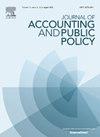Stakeholder orientation and accounting conservatism: Evidence from State-Level constituency statutes
IF 2.2
3区 管理学
Q1 BUSINESS, FINANCE
引用次数: 0
Abstract
We find that the staggered adoption of state-level constituency statutes leads to a significant decrease in accounting conservatism. Constituency statutes allow directors to consider stakeholder interests when making business decisions, thereby increasing firms’ stakeholder orientation. As firms shift attention to stakeholder interests, stakeholders become less concerned about shareholder expropriation and thus demand less conservatism. Cross-sectional analyses show stronger effects for firms with greater agency conflict between shareholders and nonfinancial stakeholders (i.e., customers, suppliers, and employees) and for firms where shareholders and debtholders have lower demand for conservatism. In additional analyses, we find that the adoption of constituency statutes does allow firms to implement corporate policies that are more friendly to their employees, customers, and suppliers. We also show that the effect of constituency statutes on conservatism still holds when the statutes only cover nonfinancial stakeholders (but not debtholders).
利益相关者导向与会计稳健性:来自州级选区法规的证据
我们发现,交错采用的州级选区法规导致会计稳健性显著下降。选区法规允许董事在做出商业决策时考虑利益相关者的利益,从而提高公司的利益相关者导向。随着企业将注意力转向利益相关者利益,利益相关者对股东侵占的担忧减少,因此要求的保守性降低。横断面分析显示,对于股东与非金融利益相关者(即客户、供应商和员工)之间代理冲突较大的公司,以及股东和债权人对保守性需求较低的公司,这种效应更强。在进一步的分析中,我们发现采用选区法规确实允许公司实施对员工、客户和供应商更友好的公司政策。我们还表明,当法规仅涵盖非金融利益相关者(但不包括债务持有人)时,选区法规对保守主义的影响仍然存在。
本文章由计算机程序翻译,如有差异,请以英文原文为准。
求助全文
约1分钟内获得全文
求助全文
来源期刊

Journal of Accounting and Public Policy
Multiple-
CiteScore
4.80
自引率
2.80%
发文量
75
期刊介绍:
The Journal of Accounting and Public Policy publishes research papers focusing on the intersection between accounting and public policy. Preference is given to papers illuminating through theoretical or empirical analysis, the effects of accounting on public policy and vice-versa. Subjects treated in this journal include the interface of accounting with economics, political science, sociology, or law. The Journal includes a section entitled Accounting Letters. This section publishes short research articles that should not exceed approximately 3,000 words. The objective of this section is to facilitate the rapid dissemination of important accounting research. Accordingly, articles submitted to this section will be reviewed within fours weeks of receipt, revisions will be limited to one, and publication will occur within four months of acceptance.
 求助内容:
求助内容: 应助结果提醒方式:
应助结果提醒方式:


